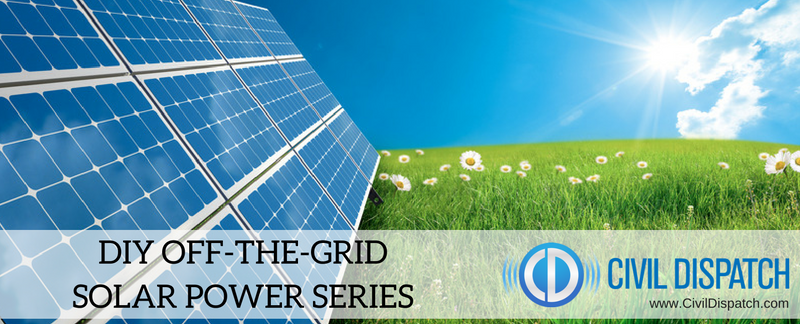
Luckily for off-gridders, homesteaders or preppers, if your grid will somehow ever go down, you can generate your own electricity. Watch the six part video series below and you will deeply understand how to create your own solar back-up system when your grid collapses.
Part One - DIY Off-Grid Solar - How To Understand and Size Your Off Grid Solar Power System
The first part of the series examines your needs with regards to the size and design of your system. As we answer every question you would have in creating your own DIY off grid / grid down solar back up system. In this first part we look at assessing your needs to size and design your own system. Things discussed in this video: The Kill-A-Watt meter for measuring your consumption, Schematic of the Tin Hat Ranch 400 Watt Renogy System, Renogy 400 Watt Premium Solar Kit, Renogy 1000 Watt Pure Sine Wave Inverter, Solar Assessment Worksheet, Renogy
Part 2 - DIY Off Grid Solar Power - How To Understand, Choose, and Size Batteries
The second part helps you decide on the necessary batteries. As we answer every question you would have in creating your own DIY off grid / grid down solar back up system. In this second part we look at choosing and sizing batteries. What we'll discuss in this video: Batteries Plus, Duracell SLIGC125, Other Important Information to the Series: The Kill-A-Watt meter for measuring your consumption, Schematic of the Tin Hat Ranch 400 Watt Renogy System, Renogy 400 Watt Premium Solar Kit, Renogy 1000 Watt Pure Sine Wave Inverter, Solar Assessment Worksheet, Renogy
Part Three - DIY Off Grid Solar -How And Where To Mount Solar Panels
PART 3 of the series, as we answer every question you would have in creating your own DIY off grid / grid down solar back up system. In part 3 we talk about things to consider when mounting your solar panels. Things Discussed in this video: Solar Angle Calculator, Unistrut at Home Depot, Gate Strap (hinge), Renogy Tilt Mount Bracket Other Important Information to the Series: The Kill-A-Watt meter for measuring your consumption, Schematic of the Tin Hat Ranch 400 Watt Renogy System, Renogy 400 Watt Premium Solar Kit, Renogy 1000 Watt Pure Sine Wave Inverter, Solar Assessment Worksheet
Part 4 - DIY Off Grid Solar- How To Wire Solar Panels
In the fourth part of the DIY Off Grid Solar System we take a look at wiring your solar panels. You will have to make some choices here that will affect the rest of your system. If you are just joining us and don't know where to start, how 'bout going back to the beginning? In this video we mention a link to a wire gauge ampacity chart and a wire gauge calculator. You will need these to determine the proper wire gauge to wire from the panels to the batteries. Here it is.
Part Five - DIY Off Grid Solar - Choosing A Charge Controller MPPT vs. PWM
In the fifth part, you are introduced to popular types of charge controllers, PWM and MPPT, and you can see exactly how they both work. Things aren't always watt (pun) they seem, especially when it comes to solar charge controllers. Join us in part 5 where we talk about the two popular types of charge controllers, PWM and MPPT, and the how they work with your solar system. Your decisions here can directly affect your wiring decisions, which was the subject of the last video.
In this video we talked about: Renogy 30Amp PWM Controller, Renogy 40 Amp MPPT Charge Controller
Part Six - DIY Off Grid Solar- The Battery Box and Safety
The last part explains the battery box and some safety items. Safety is the most often overlooked aspect of any DIY project. It's usually an afterthought at best, but something with this much power and potential for property destruction and injury, it should be at the forefront. Join us as we run through the things you need to be concerned with in your DIY Off Grid Solar System, the battery box and safety items. Items discussed in this video: Schematic (contains links to switches, boxes, and fuses, Voltage chart download
Part Seven - DIY Off Grid Solar- Living With Off Grid Power In SHTF
Living with solar power after the grid goes down has rules and nuances. There are also some "tools" that utilize electricity that can help you in your decisions on spending the energy you generate.